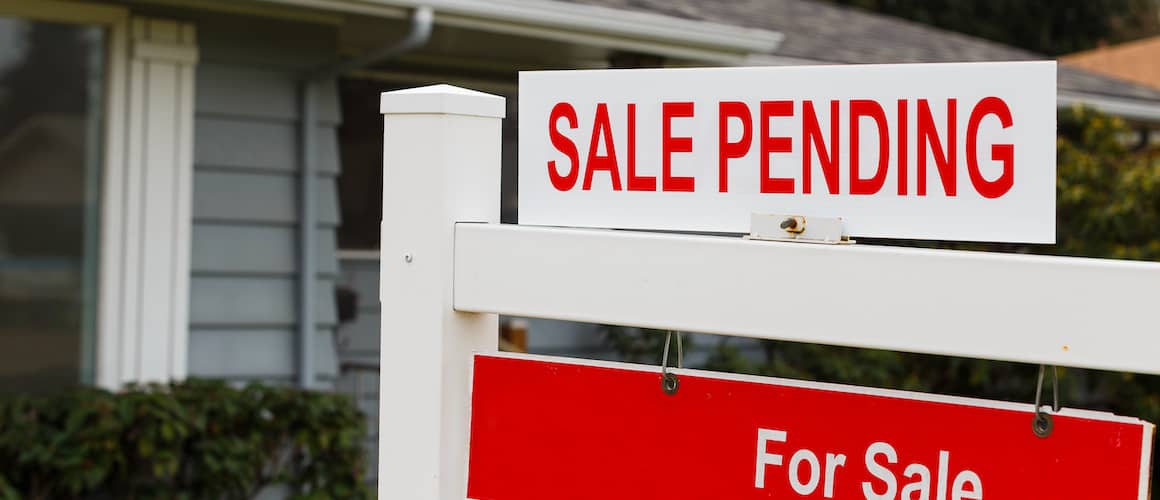You’re preapproved for a mortgage, and you’re on the hunt for your dream home. You finally find a home that would be a perfect fit, but you see that the listing has a word attached to it: “pending.”
What does it mean when a house is pending? A home listed as pending means there’s an offer on the home – and unless something goes wrong with the sale – you may have missed your chance to buy the property.
What Does It Mean When A House Is Pending?
When a home has a pending offer, it means a buyer has made an offer that the property’s seller has accepted. The seller and buyer are just waiting to close on the sale.
When a home is pending, other buyers can’t try to outbid the buyer for the property. Unless the sale falls through, your chance to buy the home has most likely passed. While it’s unlikely the original deal will fall through – it’s not impossible.
A pending sale suggests a strong possibility of closing, but other statuses can provide different levels of opportunity for you to make an offer.
Contingent Vs. Pending Sale
You may see a home listed as “contingent.” The key difference between a pending sale and a contingent home sale is that the contingent listing can only move forward once specific conditions are satisfied.
For instance, a seller can accept a buyer’s offer that includes a contingency that the buyer won’t close the purchase of the seller’s home until the buyer sells their home.
You can put an offer in on a contingent home because the listing is still active. The seller will consider all other offers if the home sale falls through. Not all contingent offers fall through. But your odds of getting your offer in front of a seller are higher with contingent listings than with pending sales.
Under Contract Vs. Pending Sale
Under contract, or active under contract, is the stage before contingent and pending sale. It means that the seller has accepted an offer, but they’re still negotiating the terms of the agreement. The home is about to go off the market at this stage.
Motivated buyers can take a final opportunity to submit a competing offer. To make their offer more attractive to the seller, a buyer may need to take a calculated risk, like waiving contingencies.
What’s Your Goal?
Buy A Home
Discover mortgage options that fit your unique financial needs.

Refinance
Refinance your mortgage to have more money for what matters.
Tap Into Equity
Use your home’s equity and unlock cash to achieve your goals.
Can You Put An Offer On A Pending House?
You can put in a backup offer on a home that’s pending. But you can’t simply outbid the buyer. Buyers typically include language in their purchase agreements stating that once the seller accepts the buyer’s offer, they can’t cancel the sale even if they receive a higher offer from another buyer.
If the pending home sale falls through, the seller is free to consider your offer on their home.
However, a pending sale has a high likelihood of closing. Consider your timetable for home buying and keep looking while you wait.
Ready To Become A Homeowner?
Get matched with a lender that can help you find the right mortgage.
Can Real Estate Agents Still Show Pending Homes?
Because a home with a pending sale is still technically on the market, real estate agents can show pending homes to prospective buyers. But most agents won’t because most pending home sales close. Showing pending homes would usually waste an agent’s and a buyer’s time. Many homeowners don’t even want to show their properties if they have a sale pending.
Take The First Step To Buying A Home
Find a lender that will work with your unique financial situation.
How Long Does A Pending Offer Last?
While it varies, a pending sale usually takes from a week to 60 days, depending on the nature of the sale and whether the buyer is paying cash or taking out a mortgage. During this time, buyers will pay for a home inspection, request any needed repairs, secure their financing and check the home’s title.
Why Do Pending Home Sales Fall Through?
While rare, pending home sales can fall through, so there’s always a chance – however slim – that you might be able to buy a pending home.
Here are some common reasons why a pending home sale might not reach the closing table:
Financials Fall Through
If the buyer can’t qualify for a mortgage to cover the cost of the home, the pending sale will fall through. The fear of not closing because financing falls through is why many home sellers only accept offers from buyers preapproved for a mortgage loan.
Failed Home Inspections
If a home inspection uncovers serious problems, the buyer may withdraw their offer and walk away from the sale. This scenario requires extra caution. The problem that scared away the original buyer may be an expensive one for you to tackle.
Buyer’s Remorse
If the buyer suddenly experiences buyer’s remorse and no longer wants to buy the home – they can cancel the sale even after their offer is accepted. However, a buyer with a sudden case of cold feet is rare. Buyers would risk a financial hit, losing their earnest money deposit if they back out of a sale after their offer is accepted.
Low Appraisal
After the buyer and seller agree on an offer, the buyer’s mortgage lender will order a third-party home appraisal to determine the home’s fair market value. An appraisal contingency may derail the sale if the market value is lower than the sales price.
The Bottom Line
While you can make an offer on a pending home, consider whether it’s worth your time. A backup offer on a pending home rarely turns into a sale. That’s why it’s best to focus on homes that haven’t attracted offers.

Dan Rafter
Dan Rafter has been writing about personal finance for more than 15 years. He's written for publications such as The Washington Post, Chicago Tribune and Wise Bread.












